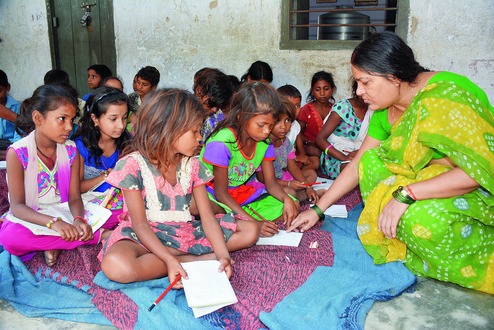
Patna: Activity-based learning can work wonders in ensuring better school education and learning outcome, a two-year project in Purnea district has found.
The project, initiated by Delhi-based research oriented civil society organisation Deshkal Society in association with schools and parents, has shown spectacular improvement in learning outcome among 48,000 Class I to Class V students enrolled in 165 primary and upper primary schools.
Around 1,000 teachers were also involved in the project from 2016 to 2018 in Krityanand Nagar block of Purnea, around 300km east of Patna.
Under the project, the percentage of Class I to V students who could not read came down from 45.4 per cent in 2016 to 19.6 per cent in 2018.
The percentage of students who could read whole words more than doubled from 9 per cent in 2016 to 21.6 per cent in 2018.
And the percentage of students who could read a simple paragraph went up from 4.3 in 2016 to 7.1 in 2018.
Similar improvements were noticed in learning of arithmetic by the students covered under the project.
The percentage of students who could not solve any sum came down from 35.6 per cent to 16.5 in two years.
"We achieved these results by introducing activities-based learning during the project. These involved simple things like card-based and chart-based learning for numbers and alphabets, as well as use of stories for teaching purposes," said Sanjay Kumar, secretary of Deshkal.
Activity-based learning, he said, has three salient features - change in classroom teaching model, teachers not being used like preachers, and kids being given initiative to facilitate the learning process and for getting involved.
"We divided the classes into groups and competent kids (children with better learning levels) were made group leaders. The groups were encouraged to get involved in the learning process by use of cards and charts, and teachers were assigned the role of facilitators," Sanjay added.
Studies over the years by the National Council Of Educational Research And Training and the NGO Pratham have shown that the problem in primary education is not of enrolment of children, but of poor learning outcomes.
In Bihar, the gross enrolment ratio - the ratio of the number of students who live in that country to those who qualify for the particular grade level - in schools among the 6-14 years age group is as high as 97.5.
The major challenge that remains to be addressed is how to develop teaching - learning practices for achieving the goal of higher learning outcomes among the children of various classes.
"On the basis of our research project, we have recommended policy-level changes in the conventional method of teaching and learning in schools in two ways - providing minimum activity-based resource material to all classes, and bringing activity-based learning in the centre of pre-service and in-service teacher's education and training courses," Sanjay said.
The Deshkal Society has suggested that the state government scale-up this model project in at least one district of the state "so that the community doesn't lose trust in government schools".










